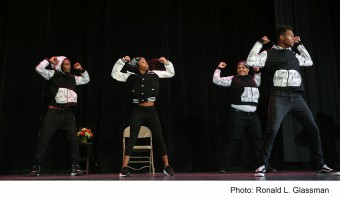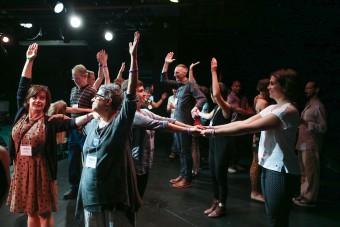This is page 2 of “An Introduction to Performing The World” … for page 1 please click here

All Stars Project
Just as valuable as the formal PTW2016 sessions were the conversations over lunch, in the hallways, between sessions.
I was fortunate enough to have lined up a meeting with Joyce Dattner, a Board Director for the All Stars Project Inc. All Stars’ Mission is to ‘transform the lives of youth and poor communities using the developmental power of performance, in partnership with caring adults.’
I had wanted to meet with Joyce because of my role as a Board Director for Western Edge Youth Arts, a socially engaged youth theatre company working predominantly in Melbourne’s West with culturally and economically diverse young people.
Joyce recounted to me the political roots of the All Stars Project Inc., a national nonprofit organisation founded in 1981. The founders of the All Stars Project were driven to “change the totality of American culture, including all institutions, political, educational and psychological, because ordinary Americans weren’t shaping our lives and with no agency in our lives, then we don’t grow emotionally and psychologically”. In brief, Joyce said, “The founders of the All Stars Project believed in the founding principles of democracy.”
From its humble origins canvassing in wealthy areas, setting up tables to ask for donations, thirty years on All Stars now raise over US$2 million per annum. Joyce stated how All Stars decided from the very beginning not to apply for government funding. When asked why, she said, “Because it comes with strings attached and conditions that are always changing. We strategically decided not to go for it.”
All Stars is entirely privately funded. Joyce said, “One of the things that really surprised us was how people who worked in corporations became some of our closest friends. Initially we thought, they wouldn’t be interested in something like this, but we were wrong!”
As part of their fundraising events, All Stars work with a committee of donors who commit to inviting their friends to pay for and attend the gala dinners. All Stars also engage in company partnerships that give in-kind support for the dinners and support in a long-term fashion.
The United States has a much more robust philanthropic culture than Australia. However, the landscape in Australia is shifting, especially as government funding for the arts continues to shrink.
In August 2016, I represented Western Edge Youth Arts at The Funding Network’s pitching event, which connected 4 socially engaged Not-for-Profit Organisations with individual philanthropists who pledged their financial support on the night. Initiatives like this give a glimpse of the potential growth for philanthropic and corporate support for the arts in Australia.
Challenges for people of Non-English Speaking Backgrounds (NESB)
There were over 30 countries represented at PTW2016.
Towards the end of the first day, I sat next to a woman from Barcelona, who is now a resident of Nicaragua. We both looked extremely fatigued. She said to me, “I understand English just fine. But to spend the whole day listening and speaking in English, is very tiring for me.”
I was reminded of one of the privileged ways in which I was experiencing the conference: I was fluent and very comfortable in both listening and speaking in English. I came to find it problematic that all the spaces, sessions and opportunities for interaction was based on the premise that English would be the connecting language.
The privileging of the English language was the source of some discomfort for me personally, during the delivery of my own presentation. There was only one other Indonesian attendee, a Chinese-Indonesian woman who was based in Taiwan, who came to my session. While I spoke about a period of violence of May 1998 in Indonesia, which she had had a direct lived experience of, she had to have my words translated from English to Mandarin. I found myself in the position of speaking about our common history as ethnic Chinese-Indonesian women, but doing so in a language which hindered a dialogue with her.
There was no opportunity for people who spoke languages other than English as their mother tongue, to assume the position of power by having their native tongue as the connecting language and expecting other people to learn it, in order to communicate with them.
Acknowledgement of country
I began my presentation by asking the people in the room whether they did Acknowledgements of Country in the United States. Clearly this was not a regular practice and for some people it was the first time they had heard of such a thing.
So, I proceeded by acknowledging that we were meeting on the lands of the Lanape people and that I paid my respects to their elders, past, present and future. Many people came up to me after the presentation to say how that acknowledgement shifted the energy in the room in a comforting way.
This was another element that I felt was lacking in PTW2016, the representation of First Nations peoples. I do not understand how we can speak about healing and changing the world without acknowledging the past genocides committed on the very land we were gathering on. It simply does not make sense.

Conclusion
Overall, PTW 2016 gave me an invigorating and insightful experience, which affirmed how we are part of a global community, where challenges facing us locally have parallel resonances internationally.
This can be the cause of some distress, of course, as we are confronted by the scale and breadth of these challenges, including the prevalence of violence, social anxiety, homelessness and so much more.
On the other hand, the global scale can also motivate us to connect even more so on an international level and to learn from each other in order to mobilise action within our own communities.
Some useful links:

